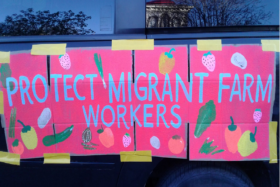Joint press release by CLC-BHN, IAVGO, and J4MW on their intervention in Schuyler Farms v Dr Nesathurai

For Immediate Release
August 28, 2020 / Toronto
ADVOCATES HAIL SIGNIFICANT VICTORY FOR MIGRANT FARM WORKERS:
Divisional Court restores rule to protect the spread of COVID-19 amongst migrant workers during quarantine period
Advocates for migrant workers welcome the unanimous decision of the Superior Court of Justice in Schuyler Farms Limited v. Dr. Nesathurai, 2020 ONSC 4711.The Court overturned the Health Services Appeal and Review Board’s decision to strike the Medical Officer of Health’s order, which limited the number of migrant farm workers to three per bunkhouse during their mandatory 14-day quarantine period upon arrival in Canada. The Board had sided with Norfolk County farmer Brett Schuyler, who argued that the order was “unreasonable” and “arbitrary.”
In a scathing rebuke of the Board’s decision, the Court held that “Decreasing health inequities as required under the Guideline requires that the number of workers that are allowed to isolate together is such that the risk posed to their health is comparable to that of the rest of the population when they are quarantined […] Allowing larger numbers to isolate together exposes [migrant farm workers] to a level of risk not tolerated for others in the community, thereby increasing the vulnerability of an already vulnerable group.” The Court also held that “If the order is necessary, especially in circumstances where the risk is high, then its financial impact is irrelevant.”
The Community Legal Clinic of Brant, Haldimand, and Norfolk (CLC-BHN), the Industrial Accident Victims Group of Ontario (IAVGO), and Justicia for Migrant Workers (J4MW) intervened as a coalition, shedding light on the lived realities of workers employed under Canada’s migrant farm worker programs, and in particular the Seasonal Agricultural Workers Program. Their labour is all too often valued over their lives and safety. Canadian Lawyers for International Human Rights (CLAIHR) also intervened.
“At the heart of this decision was the question of whether migrant farm workers would be afforded even this baseline level of protection in the midst of a global pandemic,” said Dora Chan, a staff lawyer at IAVGO. “And while we celebrate this decision,” she added, “we must also recognize that this order does not address the root causes of the vulnerability that they face, chief among which is their immigration status. These are systemic issues in need of broader reform.”
Maleeka Mohamed and Shane Martínez, co-counsel for Justicia, also emphasized this need for systemic change. The decision “affirms the issues raised by Justicia and countless migrant workers across Canada,” said Mohamed. “Specifically,” she continued, “the Court’s explicit recognition and discussion of the particular vulnerabilities migrant workers face as a result of the nature of the work permit system under which they are hired, highlights the importance of Justicia’s demands for status for all migrant workers upon arrival to Canada.” “We must continue to raise awareness and demand further systemic changes to appropriately protect these essential workers who are the lifeblood of the agricultural industry in Canada,” said Martínez.
The coalition makes the following recommendations moving forward:
- The Chief Medical Officer of Ontario must implement the 3 person to a bunkhouse rule across the province.
- The 3 person to a bunkhouse rule must be implemented beyond the mandatory quarantine period, and workers must have their own bedrooms, bathrooms and kitchens for the entire season.
- Ontario must take responsibility to cover the costs during the quarantine period, looking to British Columbia’s approach that sees the province paying for the food and accommodation of migrant workers while they quarantine.
- The Ministry of Labour must immediately extend inspections to cover farm worker housing.
- The protections of the Residential Tenancies Act must extend to Agricultural dwellings.
- Race and socio-demographic data that is also disaggregated by occupation and industry, must be collected to help identify inequities in public health.
- An anti-reprisal mechanism must be implemented and enforced in each municipality where migrant workers are employed. If a migrant worker faces a reprisal for reporting housing or sickness concerns (whether COVID-19 related or not) or are not permitted to return to work the following year, employers must face severe penalties and fines.
- Workers who are in quarantine must have access to medical staff who have cultural and linguistic competency, and an understanding of the racial disparities in accessing healthcare for migrant workers. Staff should also be visiting workers regularly, and not simply conducting interviews with workers by phone.
- Workers must be granted permanent resident status upon arrival.
Contact:
Dora Chan, Staff Lawyer, IAVGO: 416-924-6477 ext. 4524 chandr@lao.on.ca
Shane Martínez, Lawyer, Martínez Law, J4MW: 647-717-8111 shane@martinezlaw.ca
Maleeka Mohamed, Lawyer, J4MW: 416-558-0086 maleeka.mohamed@gmail.com
Chris Ramsaroop, Organizer, J4MW: 647-834-4932 ramsaroopchris@gmail.com






